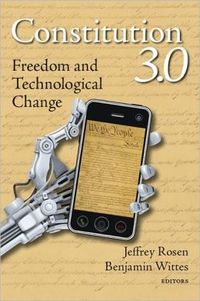

Purchase
Freedom and Technological Change
Brookings Institution Press
December 2011
On Sale: December 7, 2011
271 pages
ISBN: 0815722125
EAN: 9780815722120
Paperback
Add to Wish List
Non-Fiction
Technological changes are posing stark challenges to
America's core values. Basic constitutional principles find
themselves under stress from stunning advances that were
unimaginable even a few decades ago, much less during the
Founders' era. Policymakers and scholars must begin thinking
about how constitutional principles are being tested by
technological change and how to ensure that those principles
can be preserved without hindering technological
progress. Constitution 3.0, a product of the
Brookings Institution's landmark Future of the Constitution
program, presents an invaluable roadmap for responding to
the challenge of adapting our constitutional values to
future technological developments. Renowned legal analysts
Jeffrey Rosen and Benjamin Wittes asked a diverse group of
leading scholars to imagine plausible technological
developments in or near the year 2025 that would stress
current constitutional law and to propose possible
solutions. Some tackled issues certain to arise in the very
near future, while others addressed more speculative or
hypothetical questions. Some favor judicial responses to the
scenarios they pose; others prefer legislative or regulatory
responses. Here is a sampling of the questions raised
and answered in Constitution 3.0: • How do we
ensure our security in the face of the biotechnology
revolution and our overwhelming dependence on
internationally networked computers? • How do we
protect free speech and privacy in a world in which Google
and Facebook have more control than any government or
judge? • How will advances in brain scan technologies
affect the constitutional right against
self-incrimination? • Are Fourth Amendment protections
against unreasonable search and seizure obsolete in an age
of ubiquitous video and unlimited data storage and
processing? • How vigorously should society and the
law respect the autonomy of individuals to manipulate their
genes and design their own babies? Individually and
collectively, the deeply thoughtful analyses in
Constitution 3.0 present an innovative roadmap for
adapting our core legal values, in the interest of keeping
the Constitution relevant through the 21st
century. Contributors include Jamie Boyle, Erich
Cohen, Robert George, Jack Goldsmith, Orin Kerr, Lawrence
Lessig, Stephen Morse, John Robertson, Jeffrey Rosen,
Christopher Slobogin, O. Carter Snead, Benjamin Wittes, Tim
Wu, and Jonathan Zittrain.
Comments
No comments posted.
Registered users may leave comments.
Log in or register now!
| 


 © 2003-2025 off-the-edge.net
all rights reserved Privacy Policy
© 2003-2025 off-the-edge.net
all rights reserved Privacy Policy